
June 19
1861 Birth: Douglas Haig:
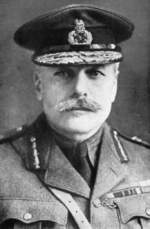
In December 1915, following over a year of the war of attrition on the Western Front, Sir John French, the commander in chief of the British Expeditionary force, was replaced. His position as the Commander in Chief of the British forces on the Western Front was given to Douglas Haig, who had previously served with distinction in the first battle of Ypres and at Mons.
Haig was a career soldier, having already served as the Director of Military strategy and as the Chief of Staff of the Indian Army. As such it was felt that he would be well equipped to adapt to the new form of warfare that was being experienced on the Western front; Sir John French had become increasingly bemused and depressed by the nature of war in France.
Almost immediately Haig was pressurised to launch a large offensive, to relieve the pressure on the French who were suffering a prolonged defense of Verdun. Haig's response was to plan a large scale offensive in the Somme Valley. Under Haig the British forces suffered massive losses in the battle of the Somme, attributed by many to his misunderstanding of the new forms of weaponry used in the conflict: he is known to have said that the machine gun was an overrated weapon and was later quite dismissive of the role that tanks could play on the battlefield.
Historians are divided about Haig's role in the war. Many argue that his tactics led to the deaths of far more men than was absolutely necessary whilst others point to the pressure he was placed under by the French and British politicians. On the one hand losses in the major campaigns on the Somme and at Passchendale were higher than ever experienced in warfare—60000 casualties on the opening day of the battle of the Somme—on the other hand the Somme did achieve its objective of relieving pressure on Verdun and did result in some territorial gains whilst at Passchendale the Germans were ground down and the salient was kept intact. For the supporters of the latter interpretation there is also the fact that Haig later oversaw the successful battles of 1918 that halted the German counter offensive: with Haig issuing the infamous 'backs to the wall' order followed by rapid advances once American troops reached the frontlines.
After the war Haig remained as the commander of the British Forces until 1921, after which he was instrumental in establishing the royal British legion, which still helps the victims of war and their families.
1862 Slavery is outlawed in U.S. territories. (AP)
1865 Birth: Alfred Hugenberg: German financier and politician:

He was president of the directorate of the Krupp firm (1909–18), entered the Reichstag in 1919, and was chairman (1928–33) of the conservative German Nationalist party. Control of the Hugenberg combine, a media and finance conglomerate, enabled him to mount a powerful propaganda campaign against Communists, socialists, and the Versailles Treaty. He was a major financial backer of the Nazis, hoping to control them, and a member of Hitler's first cabinet (1933), but he resigned after six months. His party was dissolved, and his combine gradually absorbed by the Nazi state. [For further details, Click here]
1915 World War I: List Regiment:

Gefreiter Adolf Hitler's 16 Reserve Infantry Regiment continues to occupy a position, at Fromelles—pictured above in a drawing by Hitler—which is on a level field with water channels, willow trees and willow stalks. In the distance towards the enemy lines lies an insignificant wood with barbed wire entanglements. Under the direction of their defense-minded commander, Lieutenant General Gustav Scanzoni von Lichtenfels, the regiment works ceaselessly day and night to further fortify their position at Fromelles while fighting off repeated assaults by the enemy. [For further details, Click here.]
1916 World War I: List Regiment:
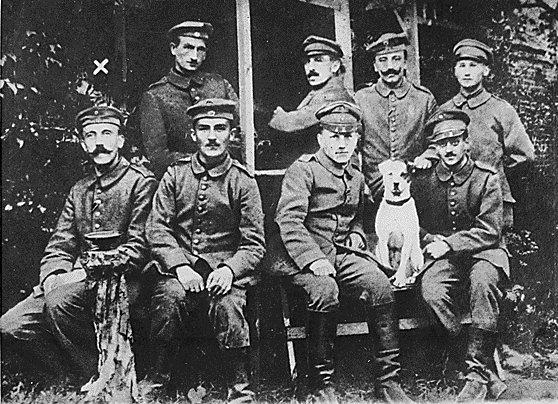
Gefreiter Adolf Hitler endures trench warfare in Flanders (Artois) with 3 Company, 16 Reserve Infantry Regiment. [For further details, Click here.]
1917 World War I: Various:
Britain's King George V changes royal surname:
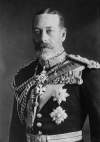
On this day in 1917, during the third year of World War I, Britain's King George V orders the British royal family to dispense with the use of German titles and surnames, changing the surname of his own family, the decidedly Germanic "Saxe-Coburg-Gotha," to Windsor. [For further details, Click here]
List Regiment: Gefreiter Adolf Hitler's 16th RIR remains east of Douai for a period of rest which will extend until June 24. [For further details, Click here.]
1918 World War I: Various:
The Battle of the Piave River goes into its fifth day:
The enemy had made progress at a number of points, but in no single instance up to his expectations. Everywhere he found himself faced with the most determined resistance. The Italian High Command had ample reserves available, and handled the situation with coolness and decision. Steps were at once taken to deprive the enemy of the gains which he had made. Torrential rains brought the Piave down in flood, and added to the embarrassments of the enemy.
List Regiment: (June 17-27) Gefreiter Adolf Hitler's 16th RIR is relieved and given a ten day rest, during which time they will pick up 329 reinforcements and an influx of lightly wounded and mildly sick men from field hospitals. [For further details, Click here.]
1935 Various:
Holocaust: The German consulate in Palestine warns Jews not to return to Germany, even for a short visit, because the Gestapo will arrest them and put them in concentration camps for "special education."
East Africa: Abyssinia (Ethiopia) asks the League of Nations to send observers into disputed areas.
1936 Sport: In an event fraught with political implications, German boxer Max Schmeling knocks out Black pugilist Joe Louis in the 12th round of their heavyweight boxing match at Yankee Stadium in New York.
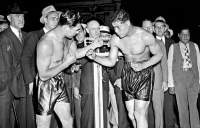
Professional boxing was among the few integrated sports in the United States, and prize fighter Joe Louis was a hero to American Blacks. On June 19, 1936, after rain postponed the fight a day, the undefeated Louis was knocked out by Germany's Max Schmeling.
German Minister of Propaganda Joseph Goebbels proclaimed Schmeling's victory a triumph for Germany and Hitlerism. The Nazi weekly journal Das Schwarze Korps (The Black Corps) commented: "Schmeling's victory was not only sport. It was a question of prestige for our race."
In a 1938 rematch, Louis defeated Schmeling in one round.
Schmeling opposed the Nazis and ultimately developed a personal friendship with Louis. In fact, Schmeling paid for a part of the American boxer's funeral arrangements, in 1981.
1939 Arthur Seyss-Inquart to Himmler:
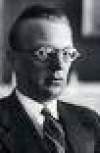
As far as my membership in the Party is concerned, I state that I was never asked to join the Party but had asked Dr. Kier in December 1931 to clarify my relationship with the Party, since I regarded the Party as the basis for the solution of the Austrian problem . . . . I paid my membership fees and, as I believe, directly to the Gau Vienna. These contributions also took place after the period of suppression. Later on I had direct contact with the Ortsgruppe in Dombach. My wife paid these fees, but the Blockleiter was never in doubt, considering that this amount, 40 shillings per month, was a share for my wife and myself, and I was in every respect treated as a Party member . . . . In every way, therefore, I felt as a Party member, considered myself a Party member, thus, as stated, as far back as December 1931.
1940 World War II:
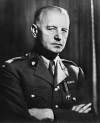
General Sikorski announces that Poland will continue to fight. Polish forces escape to England, Switzerland and Africa. Note: Poland stands alone as the only nation occupied by Nazi Germany not to surrender.
1941 World War II: France: German troops capture Brest, Toul and Strassburg.
1942 Various:
Holocaust: German Jews are ordered to turn in all their electrical and optical appliances, as well as typewriters and bicycles. (THP)
Research: Professor C. Schneider's research ward at Wiesloch is closed due to problems caused by the war. (THP)
1943 Various:
Holocaust:
Deportations of Jews from Holland and France continue throughout the month. (THP)
The last 600 workers who had remained at Belzec to complete the digging up and burning of corpses are transferred to Sobibor and shot. (THP)
World War II: The RAF carries out a raid on the Schneider armaments works at Le Creusot.
1944 World War II: Various:
Normandy: A violent storm in the English Channel wrecks the Allied artificial 'Mulberry' harbors at Omaha Beach and Arromanches.
Battle of the Philippine Sea: United States scores major victory against Japanese:

[In] what would become known as the "Marianas Turkey Shoot," U.S. carrier-based fighters decimate the Japanese Fleet with only a minimum of losses in the Battle of the Philippine Sea.
The security of the Marianas Islands, in the western Pacific, were vital to Japan, which had air bases on Saipan, Tinian, and Guam. U.S. troops were already battling the Japanese on Saipan, having landed there on the 15th. Any further intrusion would leave the Philippine Islands, and Japan itself, vulnerable to U.S. attack. The U.S. Fifth Fleet, commanded by Admiral Raymond Spruance, was on its way west from the Marshall Islands as backup for the invasion of Saipan and the rest of the Marianas. But Japanese Admiral Ozawa Jisaburo decided to challenge the American fleet, ordering 430 of his planes, launched from aircraft carriers, to attack. In what became the greatest carrier battle of the war, the United States, having already picked up the Japanese craft on radar, proceeded to shoot down more than 300 aircraft and sink two Japanese aircraft carriers, losing only 29 of their own planes in the process. It was a described in the aftermath as a "turkey shoot."
Admiral Ozawa, believing his missing planes had landed at their Guam air base, maintained his position in the Philippine Sea, allowing for a second attack of U.S. carrier-based fighter planes, this time commanded by Admiral Mitscher, to shoot down an additional 65 Japanese planes and sink another carrier. In total, the Japanese lost 480 aircraft, three-quarters of its total, not to mention most of its crews. American domination of the Marianas was now a foregone conclusion.
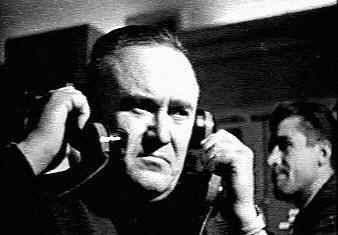
1945 World War II: The fighting continues on Okinawa:
In spite of the active role which tanks played in the fighting, a role which served to accelerate the battle, infantry combat went on as usual. One of the more conspicuous displays of recklessness occurred on 19 June when Company E, 305th Infantry, was attacked by several machine-gun nests. Sgt. John Meagher mounted a tank and was pointing out targets to the tank gunners when a Japanese raced toward the tank with a satchel charge. Meagher jumped from the tank, bayoneted the enemy soldier, and returned to the tank for a machine gun. Firing from his hip, he then moved through enemy fire toward the nearest pillbox, killed six enemy gunners there, and proceeded toward another machine gun. His ammunition gave out just as he reached the second pillbox. Meagher grabbed his empty gun by the barrel and beat the enemy crew to death. For this daring, one-man assault, Meagher was awarded the Congressional Medal of Honor.
[For Citation Click here]
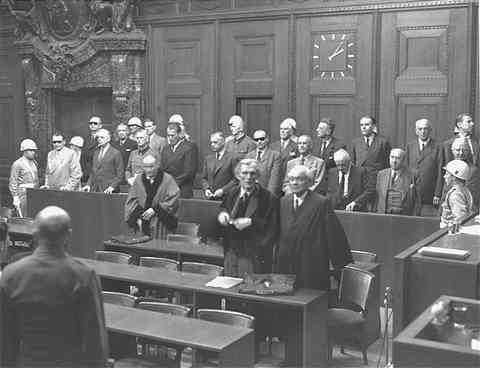
1946 Nuremberg Tribunal: Franz von Papen continues his dodge and weave defense:
Sir David Maxwell-Fyfe: Defendant, you have heard a number of your codefendants giving evidence and saying that they didn't know of the terrible repressive measures that were taking place in Germany. You knew very well about these repressive measures, did you not? You knew about the action of the Gestapo, the concentration camps, and later you knew about the elimination of the Jews, did you not?
von Papen: I only knew this much, that in the years 1933 and 1934 political opponents were interned in the concentration camps. I very frequently protested against the methods used in concentration camps. In various cases I liberated people from these camps; but at that time I was quite unaware that murders had even been committed in them.
Sir David Maxwell-Fyfe: Well now, just let me take that up. It is good to get down to a concrete instance.
von Papen: Yes.
Sir David Maxwell-Fyfe: You remember that at the beginning of 1935 your secretary, Herr Von Tschirschsky, was ordered to return from Vienna to Berlin for examination by the Gestapo. Do you remember that?
von Papen: Yes, indeed.
Sir David Maxwell-Fyfe: And you remember that he refused to go and he sent you a detailed report of his reasons for not going? Do you remember that?
von Papen: Yes.
Sir David Maxwell-Fyfe: Just let us look at that together very shortly . . . there is Herr Von Tschirschsky's own letter to you, in which he says, at the end of the second paragraph: "I am not in a position . . . to comply with the Gestapo demand to report to Berlin for interrogation." And then he says that-to quote his own words-that he has been influenced only by the "human, understandable desire to live" and then he sends a report, he encloses a report, to you of what had happened to him on 30 June which got him into the bad books of the Gestapo. Do you remember that?
von Papen: Yes.
Sir David Maxwell-Fyfe: And summarizing the beginning of it, which would be almost humorous if it did not show such a dreadful state of affairs, your secretary, Herr Von Tschirschsky, was arrested simultaneously by two competing groups of Reich policemen, I think the Criminal Police and the Gestapo, and there was a severe danger of Herr Von Tschirschsky and some of the police being shot before they could decide who was to take him into custody. [For the full text of today's proceedings, Click here.]
Kroll: As far as I was able to tell, Herr Von Papen, who spoke very frankly with me about these things, distrusted Hitler's foreign policy. He was an enemy of war, a true and sincere enemy of war; and, of course, he was also an enemy of war against Poland. He was quite convinced that an agreement could be reached on the Polish question if it could only be made clear to Hitler that a conflict with Poland would of necessity lead to a World War. He then endeavored, and I must say in very open, clear, and courageous language, to point out this view in his reports. And in his talks with the Turkish statesmen, as well as with the accredited diplomats in Ankara, he attempted to prove that, in fact, a conflict with Poland would of necessity lead to a conflict with England and France. I often told myself later that he was convinced that if everyone, Germans as well as foreigners, had spoken to Hitler in this clear manner, the war would have been avoided. [For the full text of today's proceedings, Click here.]
1947 Europe: Representatives of 22 European nations meet at the invitation of the British and French foreign ministers to participate in the design of a plan for rebuilding war-torn Europe. In a Harvard University commencement address two weeks earlier, US Secretary of State George C. Marshall had called for a massive European aid package designed to stabilize the world economy and discourage the spread of communism. Over 12.4 billion dollars were transferred to Western Europe under the Economic Recovery Program known as the 'Marshall Plan.' Not completely altruistic, the legislation creating the plan specified aid dollars be spent in the US. Nearly every Western European nation participated in the recovery effort. Although inflation proved a serious side effect of the program, within two years many countries had reached or exceeded pre-war levels of agricultural and industrial production. By encouraging European economic integration, the Marshall Plan fostered the creation of the European Economic Community of the 1950s—the precursor to today's European Union.
1953 Cold War: Rosenbergs executed:
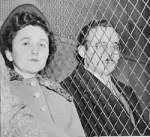
Julius and Ethel Rosenberg, who were convicted of conspiring to pass U.S. atomic secrets to the Soviets, are executed at Sing Sing Prison in Ossining, New York. Both refuse to admit any wrongdoing and proclaimed their innocence right up to the time of their deaths, by the electric chair. The Rosenbergs were the first U.S. citizens to be convicted and executed for espionage during peacetime and their case remains controversial to this day.
Julius Rosenberg was an engineer for the U.S. Army Signal Corps who was born in New York on May 12, 1918. His wife, born Ethel Greenglass, also in New York, on September 28, 1915, worked as a secretary. The couple met as members of the Young Communist League, married in 1939 and had two sons. Julius Rosenberg was arrested on suspicion of espionage on June 17, 1950, and accused of heading a spy ring that passed top-secret information concerning the atomic bomb to the Soviet Union. Ethel was arrested two months later. The Rosenbergs were implicated by David Greenglass, Ethel's younger brother and a former army sergeant and machinist at Los Alamos, the secret atomic bomb lab in New Mexico. Greenglass, who himself had confessed to providing nuclear secrets to the Soviets through an intermediary, testified against his sister and brother-in-law in court. He later served 10 years in prison.
The Rosenbergs vigorously protested their innocence, but after a brief trial that began on March 6, 1951, and attracted much media attention, the couple was convicted. On April 5, 1951, a judge sentenced them to death and the pair was taken to Sing Sing to await execution. During the next two years, the couple became the subject of both national and international debate. Some people believed that the Rosenbergs were the victims of a surge of hysterical anti-communist feeling in the United States, and protested that the death sentence handed down was cruel and unusual punishment. Many Americans, however, believed that the Rosenbergs had been dealt with justly. They agreed with President Dwight D. Eisenhower when he issued a statement declining to invoke executive clemency for the pair. He stated, "I can only say that, by immeasurably increasing the chances of atomic war, the Rosenbergs may have condemned to death tens of millions of innocent people all over the world. The execution of two human beings is a grave matter. But even graver is the thought of the millions of dead whose deaths may be directly attributable to what these spies have done."
1964 USA: Civil Rights Bill Passed:
The bill passed by the Senate outlaws discrimination in places of public accommodation, publicly owned facilities, employment and union membership and Federally aided programs. It gives the Attorney General new powers to speed school desegregation and enforce the Negro's right to vote.
The Senate bill differs from the House measure chiefly in giving states and local communities more scope and time to deal with complaints of discrimination in hiring and public accommodations. It allows the Attorney General to initiate suits in these areas where he finds a "pattern of discrimination, but does not permit him, as did the House bill, to file suits on behalf of individuals. . . .
It was a year ago today, a few weeks after the riots in Birmingham, Ala. that President Kennedy sent a draft civil rights bill to Congress. He concluded his message with these words:
"I ask you to look into your hearts--not in search of charity, for the Negro neither wants nor needs condescension--but for the one plain, proud and priceless quality that united us all as Americans: A sense of justice." [For further information, click here.]

Other journeys must follow [the first landing on the moon]. We must use the Saturn rockets, the Apollo spacecraft, and the launch facilities built up in Project Apollo—over and over again—to gain the fullest return for our investment. To make a one night stand on the moon, and go there no more, would be as senseless as building a locomotive and a trans-continental railroad, and then making one trip from New York to Los Angeles.
[See: Wunderwaffen: Hitler's Deception and the History of Rocketry.]Edited by Levi Bookin (Copy editor) Click to join 3rdReichStudies Disclaimer: This site includes diverse and controversial materials—such as excerpts from the writings of racists and anti-Semites—so that its readers can learn the nature and extent of hate and anti-Semitic discourse. It is our sincere belief that only the informed citizen can prevail over the ignorance of Racialist "thought." Far from approving these writings, this site condemns racism in all of its forms and manifestations.
levi.bookin@gmail.com










Fair Use Notice: This site may contain copyrighted material the use of which has not always been specifically authorized by the copyright owner. We are making such material available in our efforts to advance understanding of historical, political, human rights, economic, democracy, scientific, environmental, and social justice issues, etc. We believe this constitutes a "fair use" of any such copyrighted material as provided for in section 107 of the US Copyright Law. In accordance with Title 17 U.S.C. Section 107, the material on this site is distributed without profit to those who have expressed a prior interest in receiving the included information for research and educational purposes. If you wish to use copyrighted material from this site for purposes of your own that go beyond 'fair use', you must obtain permission from the copyright owner.
Please Note: The list-owner and moderators of 3rdReichStudies are not responsible for, and do not necessarily approve of, the random ads placed on our pages by our web server. They are, unfortunately, the price one pays for a 'free' website.